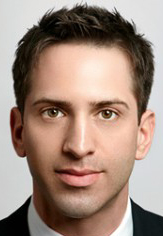Submitted on
Welcome to today’s installment of “10 Words or Less,” in which I ask brief questions of interesting people and ask for brief answers in return. In 2009, today’s participant became the youngest member of the Columbia University College of Physicians & Surgeons to run an independent research laboratory, and he’s published more than 20 peer-reviewed articles since. He’s often quoted on matters related to obesity, which is how I learned about him. Please remember: “10 words” is a goal, not a rule, so please no counting at home. And besides, it’s not so easy; let’s see you do it.
 Name Christopher Ochner
Name Christopher Ochner
Born when, where Pompton Plains, N.J., Oct. 23, 1976
Residence “Northern New Jersey.”
Family status? “Single, but in a relationship with a wonderful woman.”
Occupation “Research scientist on obesity and nutrition.”
Something people you work with would be surprised to know about you “I go to Mass and pray the rosary every Sunday.”
The worst overweight you have experienced “Not very. Maybe 165 pounds — too much pizza in college. I’m about 150 now.
A food rule you follow “I am not allowed to have M&Ms or ice cream in my house. Not that I don’t eat them, but I choose to not have them in the house, because then I would eat the whole thing right away.”
Your greatest bias in treating obesity “Probably that I’m a reductionist. I believe everything comes down to chemistry in the brain.”
Is there a promising trend in obesity treatment “There is some indication that obesity is at least starting to level off in adults and some US states have shown a slight reduction in very young children.”
A voice on obesity you admire/agree with “Dr. Eric Stice. He’s outstandingly prolific, but still makes time for family and hobbies.”
An interesting fact about binge eating “People assume people who binge and purge are thin, but that’s not really the case. Most bulimics are slightly overweight. It’s not only problematic, but not necessarily effective for what they’re using it for.”
Are there any unhealthy foods? “There are lots of unhealthy foods. The most unhealthy are those laden with added sugar and trans fats.”
Does food addiction exist? “I believe that the way most people conceptualize addiction, food could be considered an addictive substance.”
You were quoted saying "If we cut 20 or 30 calories out of our diet per day — that’s like three potato chips — we wouldn’t have an obesity problem.” Were you quoted accurately? “Yes, but there is a little bit more to that. … The obesity epidemic is not a result of massive binge eating but progressive, passive overconsumption.”
You’ve compared Overeaters Anonymous’s effectiveness to commercial diets, which is to say, not very, especially compared to Gamblers Anonymous and other such fellowships. Where do you get your data? “I can send you references [included below], but almost every commercial diet out there is successful in the short term, and that includes Atkins, all the way up through low-fat, low-carb, low-glycemic. … The problem is the weight almost always comes back.”
Do you believe that forever cutting out favorite foods is a bad idea? “Very, very much. The only diet we know that people can stick to is the American diet. That teaches us that people are going to eat the foods they love to eat. The trick is not cutting out the foods we love to eat, but finding a way to make the foods we love to eat better for us.”
Something that needs to change “The food environment. You can’t throw a rock in Manhattan without hitting a McDonald’s or Starbucks. Temptation is everywhere. And we’re built, biological speaking, to survive starvation, which means we store as much excess energy, calories, as we possibly can."
Something you’re a little sheepish about enjoying “Driving cars quickly.”
What do you drive? “Porsche.”
How would you define sustainability “The ability for most individuals to maintain a particular behavior.”
How do you sustain yourself? “I’m very particular about my diet and physical activity habits.”
What’s the thing that you wish everyone would just get right. “Understanding that obesity is maintained by biological factors. It’s not a lifestyle choice once someone has been obese for some time.”
ADDENDUM: Dr. Ochner provided references to two studies, Commercial and Self-help Programs for Weight Control and Systematic Review: An Evaluation of Major Commercial Weight Loss Programs in the United States. He added, in the accompanying e-mail: "OA is a commercial program, with the only evaluative data I remember seeing on it saying that participants lost around 20lbs on average and started somewhere between 200-300lbs on average but it was a small sample. That's about on par with the rest of the gang. The 45lb figure comes from their (basically promotional) material and wasn't based on any actual data (member survey if I remember correctly) so I'd bet the farm that's an overestimate- right along with the weight loss maintenance figures. Not to say it's not legit or at least as legit as programs like Jenny Craig and Weight Watchers, but there's no magic to it- no reason why it would produce greater weight loss than clinical programs run by the greatest clinical research minds on the planet (eg, Tom Wadden & Rina Wing), who typically wind up seeing similar rates of average weight loss."
To which I attach a study provided by Overeaters Anonymous. I quarrel with Dr. Ochner's description of OA as a "commercial program," in that it states there are "no dues or fees for members." That's germane because an outfit with no profit motive would have less motivation to rig its data. Still, it's true that "member survey" is not equivalent to scientific survey.
Still, I've included his two references, added OA's, and leave it to you to evaluate for yourselves. As always, comments wanted!
- Michael's blog
- Log in to post comments